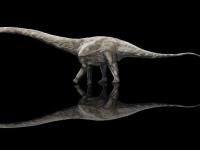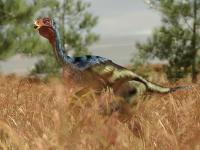Update: The fossil mentioned in the story has now been sold. A private buyer purchased the specimen for US$2.36 million dollars.
A fossil of a carnivorous dinosaur found in the United States is about to go under the hammer. The Parisian auction house managing the sale, scheduled for 4 June in the Eiffel Tower, says the nearly complete, nine-metre-long specimen is probably a new species, and hopes that it will fetch €1.2 million–1.8 million (US$1.4 million–2.1 million). But international palaeontologists warn that the specimen could be lost to science. They fear that a growing trend for the private sale of fossils is driving up prices, putting potentially valuable specimens beyond the reach of cash-strapped museums and public institutions.
Auctioneer Aguttes says the fossil bears similarities to a species of Allosaurus, but has differences in features including its teeth, skull and pelvis that are significant enough for it to be considered a new species. The creature lived about 154 million years ago, during the late Jurassic period. Although palaeontologists say that detailed studies are needed to confirm that it is a new species, they agree that the fossil, excavated on private land in Wyoming between 2013 and 2015, seems to be unusual and therefore scientifically significant.
The Society of Vertebrate Paleontology (SVP) in Bethesda, Maryland, which represents more than 2,200 international palaeontologists, has written to Aguttes, urging the auction house to cancel the sale. David Polly, the society’s president, told Nature that the society is concerned about scientifically valuable fossils going into private hands rather than a public repository where scientists can examine and interpret them. “Fossil specimens that are sold into private hands are lost to science,” the letter states.
Long-standing debate
Aguttes spokesperson Eric Mickeler says it is his hope that the fossil will end up in a museum. But in any case, “the sale is honest, public, legal and documented”, he says. The debate over who can buy and sell fossils is an old one, he adds. “Since the nineteenth century, the market of fossils was organized and animated by private companies and private buyers, not only by museums.”
But some scientists are worried that the auction reflects a wider increase in the private sale of fossils, often legally obtained, which can attract staggering sums of money.
Although the SVP doesn’t collect data on the number of dinosaur fossils sold at auction, Polly says these sales seem to be increasing in frequency. “Very-high-priced auctions are becoming much more common,” he says.
Sales boom
Paris has hosted numerous fossil auctions in the past few years. In April, auction house Binoche et Giquello fetched more than €1.4 million apiece for skeletons of an Allosaurus and a Diplodocus; it also sold a Triceratops skull in 2017. Aguttes sold an Allosaurus for more than €1.1 million in 2016, and a Siberian mammoth for €548,000 in 2017.
But most museums have limited funds for such purchases, says Polly. “Any auction likely to generate a high market value is of concern, because science generally operates on a low budget,” he says. “We don’t have money to pay people to collect fossils or to buy them on the open market, and we also view fossils as being part of natural heritage, so we are quite concerned about the creation of commercial value for them.”
Paul Barrett, a palaeontologist at the Natural History Museum in London, says that because museums are buying fewer fossils, owing to tighter budgets and the fact that many established museums already have large collections, commercial fossil collectors may now be targeting private buyers. “There seem to be a larger number of wealthy companies and individuals interested in acquiring dinosaurs,” he says.
Fossil hotspot
Dinosaur fossils sold at auctions have mostly been excavated from private land in the United States, says Barrett. “The USA is now, basically, the only place where it’s possible to obtain dinosaur skeletons to sell legally on a regular basis,” he says. “There are other places, including the UK, where it would be legal also under certain circumstances, it’s just that complete skeletons don’t appear often outside the USA.” Many other countries where complete fossils can be found, such as China, Mongolia and Argentina, have laws prohibiting the export of fossils.
Palaeontologist Phil Currie at the University of Alberta in Edmonton, Canada, says the United States needs a philanthropic fund to buy legally collected private specimens and place them in US museums. Polly wants new US regulations or legislation to ensure that scientifically important specimens from private land go into public collections.
Vincent Santucci, a palaeontologist for the US National Park Service in Washington DC, has been monitoring the trade in fossils since the 1980s. He doesn’t foresee regulations being placed on the sale and movement of fossils found on private land any time soon. “The notion of private property in the US is so entrenched,” he says.
But Santucci is worried that highly publicized auctions of fossils encourage amateur fossil hunters to collect specimens illegally from federal lands in the United States, such as national parks, from which their excavation, sale and export is prohibited.
“There are large expanses of public land in the west of the US where fossils are relatively abundant. Individuals may feel compelled to go out and collect these — not for science, and not for education, but merely so they can make a fast buck,” Santucci adds.
doi: 10.1038/d41586-018-05299-3









